It was Wichai Praisa-Ngob's first day in the job in 2009 and he was delayed, meeting and greeting well-wishers. A new governor's first day is always special.
Sitting waiting for a 2pm appointment, German Ambassador Dr Hanns H. Schumacher decided after nearly one hour that he had had enough.
With Mr Naumann, the Phuket honorary consul, he walked out of Phuket Provincial Hall breathing the kind of heat usually reserved for movie dragons.
The fiery blast Dr Schumacher delivered went like this: ''I as well as other European ambassadors are about to investigate the situation that too frequently, our embassies are not informed when our nationals are either detained or die in an area of jurisdiction of any police district in Thailand.
''Thailand has signed the international convention on consular affairs and it has the legal commitment to inform the embassies as soon as possible. I understand that this is not so much a question of goodwill. The authorities in Bangkok are quite cooperative.
''But it has to go down, trickle down, to the local police authorities. This was an issue I would have loved to discuss with the governor.''
The collateral damage was probably intense.
Yet just a few months later, the governor and the ambassador shook hands and made up.The wonderful new idea of the consuls meeting every three months with the governor and local authorities in an open forum was born.
More than any other individual, Dirk Naumann is responsible for the success of those consuls' forums.
In relaying the problems of Phuket to Bangkok's ambassadors, the consuls triggered a chain of communications that went right to the top.
Having been told about Phuket's problems by the consuls, the ambassadors in turn conveyed the problems to Bangkok ministries, who in turn conveyed the problems to successive governments . . . and so on, eventually, to the Army.
The process may have taken five years but the chain reaction produced a much bigger explosion than that first diplomatic hand grenade did back in 2009.
For Mr Naumann, who retired last week from the consul's role at the age of 72, there were many frustrations at those honorary consuls' gatherings.
At times, the minutes from the forums were even censored - every bit of criticism was removed from the transcript. It might have been a love-in with local officials, according to the transcript.
On those occasions, letting Bangkok know what was going on involved telephone calls or emails containing links to the coverage from Phuket's English-language media.
The lesson is, though, that perseverance pays. The process of generating change may have taken five years. But when it did come, change came swiftly and in abundance.
Without the honorary consuls' meetings, without Dirk Naumann's unstinting efforts to achieve a better Phuket, it's highly unlikely that General Prayuth Chan-ocha would ever have learned that Phuket needed fixing.
Giving perhaps his final media interview as consul in the bypass road office of the consul the other day, Dirk Naumann said it was disappointing that the present Phuket Governor, Maitree Intrusud, has chosen not to continue holding the open-forum consuls' meetings every three months.
''Everyone has to be very grateful to the Army for trying to sort out the problems,'' he said. ''The question is, will the sorting out last or will it disappear as soon as the military is gone.
''And the question is, do the Phuket people have the will to support what the Army has done now? Without the people of Phuket supporting it, without officialdom supporting it . . . let's see what happens.
''I hope it will succeed but I am not so confident.''
TAMING tuk-tuks and taxis and ending the jet-ski scams were two of the aims of Mr Naumann and his Australian consul counterpart Larry Cunningham in using the open forums to explain to all of Phuket's officials - not just the governor - why the problems needed fixing.
That was no easy task on a holiday island where people were accustomed to locals making the most of the extra income being delivered from tourism. Such a short-sighted outlook was doomed to flop in the end.
The suggestions espoused by the honorary consuls were not just good for tourists but good for residents as well.
Many of the honorary consuls are Thais. But even those who are from overseas make Phuket their home and want to improve it, for the benefit of all.
''Phuket is a foreign enclave in Thailand,'' Mr Naumann said. ''Thailand can either have the tourists and handle them properly, or not have them. There is no in-between.
''I would suggest that one way would be to restart the honorary consuls' meetings with the governor. However, I think more people from Bangkok should sit in on these meetings.
''We talk and talk and talk and nothing happens. If we want something to happen swiftly, we should have Bangkok involved.''
That would certainly overcome the problem of the minutes of the forums being censored to remove all the negatives.
Memories of when he first arrived on Phuket 12 years ago at the request of the German embassy, having had a career in Bangkok business for decades, remain strong for Dirk Naumann.
''It was paradise. Blue seas, white beaches, sunshine from morning to evening, everything was wonderful,'' he said.
''That's what I saw when I first came here. It was only later that I realised that beneath the veneer lies another Phuket.''
WITH THE taxis and tuk-tuks now being tamed, Mr Naumann believes he has a solution to the jet-ski issue on Phuket.
''The best solution is the solution of the Governor of Phang Nga. Very simple, no jet-skis. Don't tell me it cannot be done in Phuket if it can be done in Phang Nga.
''There must be something that the jet-ski operators do right to enthuse officialdom to close their eyes.''
The other issue Mr Naumann feels most strongly about is pollution of those white beaches and the ocean.
At his final consuls' meeting last year, he extracted a promise that officials on Phuket would not only begin taking readings for pollution on the shores where people swim, but also release them regularly.
''As you know, that has yet to happen,'' he said. ''Germans once came to Phuket in large numbers but not so many come now.
''They want clean oceans to swim in and taxis at a reasonable price. It cannot be that you pay more for the taxi drive than you pay for the dinner.''
HIS TOUGHEST time as consul was when the tsunami struck in 2004, and local authorities ''dumped 1000 Germans in shorts and flipflops outside the consulate.''
It was a tough time for everyone on the island, with an equal number of Thais and foreigners among the 5400 dead, with the victims from Germany and Sweden alone totalling 1080.
''The tsunami was quite an experience,'' he said. ''I think anyone who experienced the tsunami directly or indirectly has been severely touched by it.
''The touching is not something that will go away lightly. It will stay there forever.''
About 4500 Germans live in Mr Naumann's consul zone, which extends to Chumporn province on the gulf and then down to the Malaysian border, taking in Samui as well.
At a farewell event on Phuket on Friday, the present German Ambassador, Rolf Schulze, praised Mr Naumann's great work and presented him with his country's highest award for diplomatic service.
His shoes will certainly be hard to fill, said his daughter, Anette Jimenez Hoechstetter, who will be trying her best. She is the new honorary consul.
The final word, though, should go to Dirk Naumann.
''I am of the opinion that if officialdom wants to listen to the foreigners, they will have to allow the foreigners a forum where they can talk,'' he said.
''At the moment, if we had a meeting today, I would have nothing but praise for what has been done.
''what [police regional chief] Major General Panya has done with the taxis and tuk-tuks is remarkable and what other people on Phuket have done is remarkable.
''But will it last? Let's see.''


















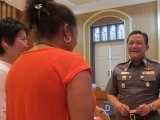

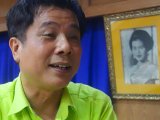

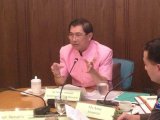
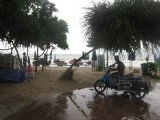
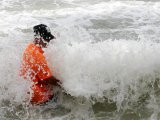
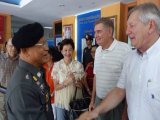





Well done, brave man.
Posted by Mike on July 21, 2014 10:51